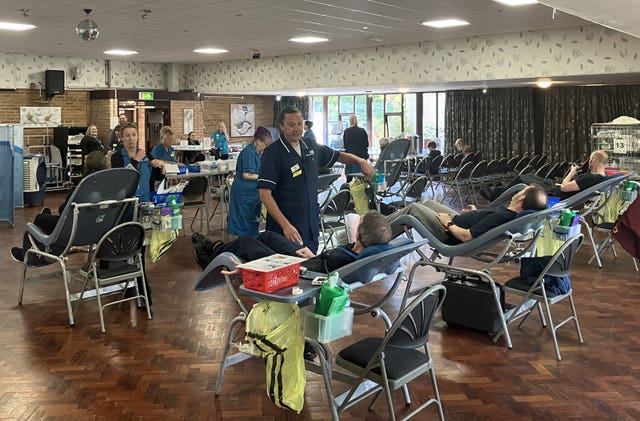Mother of Southport victim praises ‘inspiring’ blood donors
Almost 100 people donated blood at the session at St John Stone Church in Southport on Saturday.

The mother of Southport attack victim Elsie Dot Stancombe has praised “inspiring” blood donors during a drive in the seaside town.
Almost 100 people donated blood at the session at St John Stone Church in Southport on Saturday.
Seven-year-old Elsie was one of three girls murdered in the Southport mass stabbing attack at a Taylor Swift-themed dance class last summer.
Her parents, Jenni and Dave Stancombe, worked with NHS Blood and Transplant to organise the blood donation event through Elsie’s Story, the charity they founded in her memory.
Among the NHS Blood and Transplant staff supporting the session were two members of the transport team based at the Liverpool blood centre who responded to the Southport attack.
Ms Stancombe said she wanted Elsie’s Story to “create a legacy of love and hope” in her daughter’s name.
She added: “Although the outcome for Elsie was tragically different, we know that blood transfusions were crucial for many of those injured that day.
“NHS Blood and Transplant made 10 emergency deliveries of blood to hospitals treating the casualties and that quick response meant the lifesaving blood was available for everyone who needed it.
“For some people here today, giving blood is their way of repaying those whose donations were so vital that day.”
Ms Stancombe added: “We want Southport to be renowned for the warmth and generosity of its amazing community, not for the events of that day.
“Today has been a wonderful example of that.
“The atmosphere was so uplifting and inspiring and we are grateful to all the donors and staff for their support.”
Stephen Kuypers and Dave Oxton were among a team of drivers on shift the day of the Southport attacks who made 10 emergency blue-light deliveries of blood supplies in three hours to four hospitals, including Alder Hey Children’s Hospital.
Blue lights are only used when a hospital requests blood products they urgently need for a specific patient or incident, NHS Blood and Transplant said.
If a patient’s blood type is unknown, they can safely be given O negative blood, which makes it vital in emergencies.
Mr Kuypers said: “On that dreadful day last July, I took the phone call from our hospital services team informing us of a major incident and instructing us to prepare for emergency deliveries.
“At the height of the response we were making three blue light deliveries an hour, which is extremely rare. I delivered two urgent orders to Alder Hey and Aintree hospitals.
“Hospital colleagues later told us that the quick response of the Liverpool transport team helped ensure that the patients received the best possible care.
“The was a very rewarding message to receive and it meant a lot to the team who all pulled together and put in extra hours that day to ensure all the deliveries were covered.”

NHS Blood and Transplant chief executive Dr Jo Farrar said: “It is wonderful to see how many people have been inspired by Elsie’s Story to give blood, and we are thankful to Elsie’s brave parents Jenni and Dave for their incredible support.
“Because each donation can help up to three adults or six children, 300 lives or more will be saved and improved in Elsie’s memory.
“A constant supply of blood is needed every day to help patients receiving treatment for conditions like cancer, sickle cell or giving birth as well as being prepared for unexpected emergencies and incidents, just like that dreadful day last July.”
NHS Blood and Transplant said it was appealing to blood and platelet donors across England to help fill tens of thousands of appointments at town and city donor centres over the coming days and weeks.
There are concerns that four bank holidays falling in six weeks could “push blood supplies to critical levels” as donations often drop over bank holiday weekends.
The NHS is appealing for more O negative donations in particular, the blood type needed in emergencies.
NHS Blood and Transplant issued an amber alert in July 2024, which remains in place in England, due to a severe shortage of O negative blood triggered by the cyber-attack on London hospitals last year.
The attack meant major London hospitals could not cross match blood so the hospitals could only use O negative.





